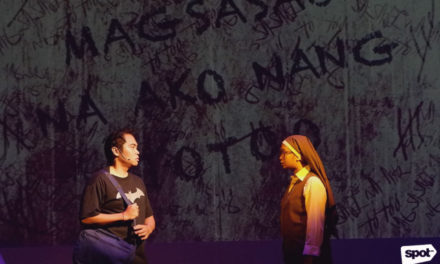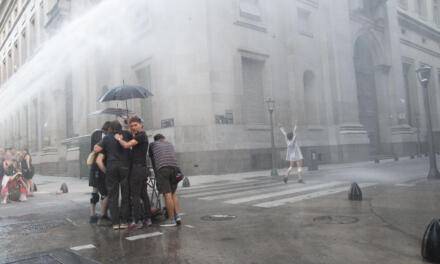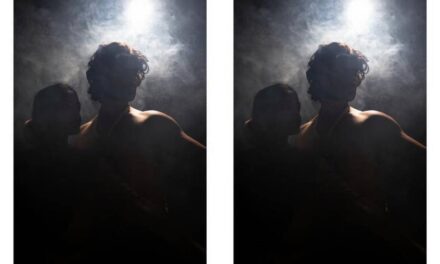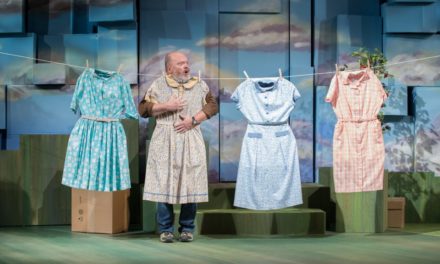The entire stage is the same shade of pale, dusty pink: the extra-long couch and side tables, the floor, the three backdrops encompassing the interior of an elegant urban apartment of the upper middle class. Topped by a geometric candelabra that throws shade in concentric, sleek circles around the couch, Răzvan Bordoș’ stage design for Florian Zeller’s 2018 play The Son at the German State Theatre communicates at once both the show’s focus on the domestic life of the Western European affluent class as well as its concern with its degeneracy and decline. The material comfort signaled through the too many cushions on the oversized couch and the velvety walls reads as stifling. The liver-shade pink occasionally looks healthy under warm light, but most of the play it nauseates in its overwhelming expanse of sickly, cancerous tones brought out by the cold, unsettling lighting designed by Cosmin Anania. The scenography sets the stage well for Zeller’s excellently written play that controls in very precise dosage a thick psychological suspense. The show depicts a family drama centered on Pierre—a recently re-married, middle-aged, French lawyer—(mis)managing the depression of his teenage son, Nicolas, a child from a previous marriage.
Under Mădălin Hîncu’s direction at the German State Theatre in Timișoara, Romania, the production took care to render Zeller’s detailed work tracing the myriad shifts in tone and mood, from the dramatic ones to the barely perceptible seeping poison. The scenography and sound design played a major role in manipulating the atmosphere, but the actors too deserve major credit for managing to represent the continuous ups and downs in their relationships, steady and implacably steering them towards a tragic downfall. Zeller comes in the line of European realist playwrights like Ibsen and Chekov who offer dream roles to actors trained in Stanislavskian methods. In the two main roles, Bülent Özdil as the father and Yannick Becker as the son, chart the difficult emotional terrain between them, from adoration, love, and care to annoyance, anger, and disgust. In his slumping around the stage, silent scowling, and perpetual slouching, occasionally broken through by luminous bursts of childishness in eager smiles, Becker convincingly transforms into a troubled seventeen-year-old. Özdil inhabits effortlessly the well-meaning pater familias figure juggling career and family. Enikő Blénessy as the ex-wife Anne frets about her difficult child and manages to convey both the resentment she carries against Pierre and his new wife, as well as her determination to be civil with everyone for Nicolas’ benefit. Played by Oana Vidoni, the sleep-deprived Sofia caring for her new-born throughout the play navigates between, on the one hand, supporting her husband and welcoming an unwell young man into her home and, on the other hand, resenting Pierre’s lack of time spent with her and the baby as well as his stubbornness in insisting that Nicolas is a normal teenager.
The costumes dot the pale pink indoors with restrained pastels—greenish for Anne, matching blue pinstripe shirts for Sofia and Pierre paired with light wash jeans for her and grayish pants for him—building a world of muted elegance that may be dull and deadly. But the design drops the finesse when it clothes Nicolas in the only dark colors on stage: dark wash jeans and dark grey hoodie slapped on with the word “toxic” lined in neon green. I mention this detail because I find it representative of the production’s tendency to overstress the disjoint between the characters and minimize their genuine connections. Zeller’s play constructs a fine balance between the love and care these family members have for each other and the toxicity among them. In fact, the ways in which they hurt each other are even more heartbreaking against the background of deep affection and the potential fulfillment and happiness that somehow constantly eludes them. Hîncu moves too quickly through the scenes meant to illustrate their love and joy, such as when Anne and Pierre interact with an intimacy that betrays how their shared love for Nicolas will always tenderly bind them, despite everything. Or when Pierre, Sofia and Nicolas happily dance and laugh together. Even if this scene ends up alienating Nicolas, it does first show him at one of his most hopeful moments, making his disconnect even more worrying. Compounding this problem is the lack of unselfconscious physical interactions between the characters. The actors perform the text and the emotions cued into the words with seamless naturalness, but the body language communicating the subtext of familial ease, care, and comfort is either lacking or looks stiff and awkward. Save for Blénessy, who reaches unrestrained towards her character’s son, the caresses attempted by Özdil and Vidoni in particular seem like chores. I wish Hîncu would have worked more with the actors to develop the gentle nonverbal aspects of their relationships in order to offset the understandable tightness of their bodies when they fight and the violence of accusatory verbal exchanges. As if to compensate for the production’s tonal and physical ponderousness, Hîncu inserts some levity through the brief appearances of a psychiatrist and a nurse who treat Nicolas after he cut himself deeper than his routine self-wounding. In not taking these medical professionals seriously and portraying them as eccentrics (marked by the doctor’s colorful vest and the funny shoes, and the nurse’s Mickey Mouse ears) Hîncu commits the same mistake that Pierre and Anne did when they signed their son’s release papers against the doctor’s advice.
Despite these off-keys, the story, the staging, and the acting remain gripping throughout the show. I’m not surprised at all by the acclaim received by Zeller’s plays like The Son, given both their dramaturgical craft and the talent with which they exploit the current anxieties of mainstream Western society. My prior knowledge of Zeller’s work was limited to two award-winning film adaptations of his plays that he directed himself: The Father (2020), with Olivia Coleman as the daughter caring for her proud octogenarian father succumbing to dementia, magisterially portrayed by Anthony Hopkins; and The Son (2022), with the action transferred to New York, where Hugh Jackman as the dad gives it his all and fails to save his son played ethereally and with surprising magnetism by Zen McGrath. While I admired in both films Zeller’s surgical-like psychological dissection of contemporary upper-middle-class family problems, these movies don’t engage me emotionally as much as artistically and intellectually. At times I felt that I may not be part of Zeller’s target audience due to my gender, class, and peripheral European nationality. Just the reeking privilege of the London flat in The Father and the Manhattan condo in The Son were enough to put me off these families and their self-absorption. But then I started suspecting that perhaps that was the point too, that Zeller is sneakily serving multiple types of audiences at the same time. For me, he’s repackaging the tragic form in which I watch with a mix of pity and Schadenfreude the fall of the rich. If for the audience that can identify with these families, The Father and The Son might be a naturalist play speaking to their deepest concerns, for me, these plays perform a different kind of invitation, that is more than enough to make Zeller one of the greatest living playwrights. The psychological mining Zeller engages in the fictional realm of his scripts might be less interesting than the psychological games he plays with the public.
Both The Father and The Son engage with the popular and populist theme of the crisis of white, Western masculinity. In the first movie, the patriarch succumbs to dementia, while in the second movie, the boy falls prey to depression. In between the doomed boomer and the “toxic” Gen Z-er, the millennial man in his prime seems tragically fated to impotence, incapable of saving neither the old men nor the boys, staring into the desert of his life where the only certain thing remains his own impending decrepitude. The objective aging of the white European population and the real, troubling high rates of mental health issues among the younger demographics are complex phenomena eluding simple causality. They demand to be met with a range of policies, from promoting a culture of work-life balance and decent pay for all jobs, to improving social services to provide child and elderly care and ensure good working conditions for the carers, to stricter regulation to protect the population against exposure to toxins linked to dementia such as heavy metals and carbon monoxide, to laws that hold tech companies accountable for the negative effects they have on young consumers. Whereas pursuing these sorts of real-impact policies requires significant socio-economic shifts and are met with resistance from the business sector (since they target citizens’ well-being, not that of companies, whose rates of growth and profit would be negatively impacted), the conservative and right-wing public discourses find it much easier to scapegoat these problems on an alleged crisis of masculinity. A thriving self-help industry peddles lessons in masculinity, online trolls rant against the frail “snowflake” generation, the elderly are cast solely as social and budgetary burdens. Zeller’s focus on white men suffering from neurological ailments amounts to him flirting with the fascist theme of degeneracy versus healthy masculinity that is regaining traction. In this way, Zeller himself exploits trendy, viral subjects that guarantee commercial success, making him not completely innocent of employing cheap tricks to garner attention, clicks, and ticket sales.
Of course, though, Zeller treats these themes with considerable nuance. The Son, for example, doesn’t stoop to pinpointing the exact, single cause of Nicolas’ depression. When angry, Nicolas blames Pierre for having left Anne, which destroyed her emotionally for a while. But while the play recognizes how divorce is hard on any kid, it refuses to establish this as a sufficient cause for clinical depression. When Pierre repeatedly asks Nicolas why he is struggling, the boy can’t explain it either, merely repeating how he just can’t manage and can’t deal with life. The Son accommodates all sorts of interpretations, from the fatalistic one in a tragic key that sees the downfall of Western man as the unavoidable resolution, to the politically conservative one that reads in the signs of surrounding comfort and protection the source of effeminacy and weakness, to my favorite take that views Zeller as critical of patriarchy. Pierre mentions his own father with bitterness, as the highly successful lawyer and politician who constantly worked, traveled, had affairs, and neglected his family even as he provided for them. In the shadow of his father, Pierre vowed to do better by his own family and sustain genuine caring relationships with them. That he still ended up in the same profession that keeps him away from Sophia who constantly complains about his absence, that he still abandoned Anne and Nicolas just like his own father (only with more guilt), turns patriarchy itself into the blood curses of ancient tragedies, where children cannot help but suffer from and repeat the sins of their fathers. In a sense, it is Pierre’s incapacity to become accountable for his role in the cycle of doom that hurts Nicolas even more. More so, however, it is his incapacity to see the issue as a societal problem, not strictly a domestic one. Ridden by inner guilt, he compensates by indulging Nicolas and enabling his suicidal tendencies.
The motif of hunting, the symbolic male occupation championed by the patriarchy, an occupation standing in for the idea of providing for the dependents of women as child bearers and homemakers, clues an anti-patriarchal reading. Pierre’s father, an embodiment of the white patriarchal colonizer, loved to hunt and go on safaris during business engagements. He gifted Pierre with a hunting rifle, passing the baton of autocratic maleness, but Pierre refuses to hunt and stores the gun in a cabinet in the house. Yet, the happiest memory he shares with Anne and Nicolas is of when they went on a safari in Africa. The overtly colonial era gave way to neocolonialism, where the white man as tourist can mask his dominance as soft power. That Nicolas was the happiest child in Africa, a “little sunshine”, mocks the deluded hope the white nuclear family may have in their future. In Hîncu’s production, the specter of violent patriarchal masculinity haunts Nicolas as a dreamlike incarnation of his own depression in the shape of a human figure with a stag’s head silently beckoning from upstage. The hunted have become the hunters, revealing a male anxiety amidst the destabilizing hierarchy where the white man may no longer be the apex predator. The patriarchal culture and its social pressures and economic expectations doom Pierre to become a version of the father he hates, the careerist lawyer busy providing and climbing the hierarchy of success leading to the ruin of his relationships and his family. Even as he’s struggling to make amends with Nicolas, Pierre is already not present in the life of his other son. His frequent fights with Sophie hint that this marriage too won’t last too long in these conditions.
In depicting nuclear families, Zeller represents the women characters in traditional roles of nurturing carers as mothers and wives. They are all secondary characters, cast in supporting roles even in artistic terms of aiding to depict the male hero’s journey. Anne and Sofia are not particularly interesting roles to act in: their sole motivations are the care they have for the men in their lives, and a love that morphs into resentment when unreciprocated. So while I appreciate Zeller’s dramaturgical skills as well as the not-too-facile take he has on a pop culture hot topic, I see The Son replicating in practice some of the social inequalities it’s bent on criticizing. I also do think that some of the interpretive openness the play allows for around the reason for Nicolas’ depression results not from a commitment to avoid an unfashionable aesthetic of a pièce à thèse, of a play that dares to clearly articulate the concrete causes of social problems. I suspect the interpretive openness is partly a cop-out, since bringing in more of the social, structural causes of poor mental health would mar the tightness of the plot. The latter is meticulous and controlled precisely because it stays within the narrow, delimited confines of a psychological, domestic drama. The Son sacrifices social depth for dramaturgical craft.
The final note I’d like to make forces me to give spoilers, so skip this paragraph if you’re planning on seeing the play or the film. The Son makes an explicit tribute to Chekov through that hunting gun which, if it’s there, must be used. After Pierre and Anne give in to Nicolas’ plaintive pleading (swearing that he’s better and that all he needs is to be with them) and take him home from the hospital, the boy serves them tea good-naturedly and full of gratitude. The hopeful tableau of a happy family that seems to have overcome an obstacle together is cut short with Nicolas going to have a shower. In his absence, Pierre and Anna eagerly continue to discuss how to care for him: when he can return to school, with which one of them he would be more comfortable living, how Pierre can take him on as an intern at his firm. The discussion is interrupted by an offstage loud bang. In the very last scene, three years later, a fully functional, debonair Nicolas visits Pierre talking about how well he and his girlfriend are doing in Berlin and gifting Pierre a copy of his first novel, Death Can Wait. When Pierre moves from the teary-eyed face of a proud father to full-on sobbing, it becomes clear that this last scene takes place in Pierre’s head. Perhaps the last scene is meant to momentarily make us doubt our understanding that Nicolas shot himself, but the effect doesn’t last long. The Son moved so single-mindedly towards the tragedy’s end in Nicolas’ death that it’s hard to believe any audience member would not know the meaning of that offstage gunshot. For some reason, Hîncu wanted to deflect that message and made Pierre and Anne have no reactions to the shot. Anne placidly collects her coat and scarf and exits the stage. I am not saying that Pierre and Anne should have melodramatically lost it, but it also makes no sense to deny Blénessy and Özdil to act out the juiciest moment in a tragedy where the recognition spells simultaneous reversal. Although he added a faux ending, Zeller pays tribute to the finale of The Seagull, where we watch Arkadina not wanting to understand the obvious conclusion that the loud bang she heard while playing cards was her son Konstantin killing himself.
Lights dim over a sobbing Pierre rocked and comforted like a child by Sofia gently humming Edith Piaf’s song “La Vie En Rose.” Earlier in the play, Nicolas said that life weighs on him because there are too many responsibilities and he doesn’t want to grow up. Perhaps the pressure we put on children to become “men” weighs too heavily. Perhaps the pressure to be “men” is what deters fathers and husbands from gaining emotional maturity.
This journalistic material has been realized through a grant Energie! Burse de Creație funded by the City of Timișoara, through the Center for Projects. The material does not necessarily represent the position of the Center for Projects and is not responsible for its content or the way in which it may be used.
This post was written by the author in their personal capacity.The opinions expressed in this article are the author’s own and do not reflect the view of The Theatre Times, their staff or collaborators.
This post was written by Ilinca Todoruţ.
The views expressed here belong to the author and do not necessarily reflect our views and opinions.


















